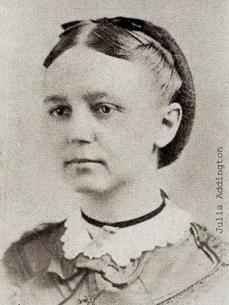Some Biographical Clippings

|
| Iowa is no place for old fogies. The time honored and old fashioned way of doing things is becoming sadly oat of joint, and those venerable fossils, the delight of whose hearts is to follow unwaveringly in the footsteps of their forefathers, find little of consolation in the. onward movement of Young America in our wide awake State. Iowa not only extends the fright of suffrage to colored men, but her while citizens have chosen colored men to office. Alas, for those who think that ail things should remain as they have been! Nor does this woeful innovation upon "the constitution as it was" to cease here. The state of public sentiment in Iowa upon the Female Suffrage question is In advance of that in many other States—and, without awaiting the slow process of constitutional changes, Iowa now enjoys the honor of a Female Office Holder! Ye shades of Buchanan and Pieron, , and all the strata's of political philosophy of the by-gone ages!—whither are we tending? At a recent election in Mitchell County Miss Julia C. Addington was elected County Superintendent of Common Schools. Miss Addingtpn does not belong to the strong minded race olf women, but is a modest, faithful teacher. After her election a kind old gentleman, who, anxious to learn her position on the coming question, inquired, "Ah, Miss Addington, are you In favor of woman's rights?" "Certainly, sir; I am in favor of everybody's rights," was the quick rejoinder. That is political philosophy in brief and to the point. Everybody's rights, regardless of sex, color, religion or anything else, and if Miss Addington proves to be an efficient and worthy public officer we don't see who is hurt or how the old fossils will help themselves. (Burlington Daily Hawk-Eye - Friday, November 5, 1869) |
Celebrating a Mitchell County milestone
by Michelle Haacke, Press-News ReporterIt's a little known fact that one of the keystones in the women's suffrage movement-and U.S. history-happened right here in Mitchell County, over a century ago. For this reason, the Mitchell County Historical Preservation Commission plans to host an event this Sunday in honor of Julia C. Addington, a Stacyville resident whose 1869 election as the County Superintendent of Schools in Mitchell County also resulted in her being the first ever woman-elected official in the country. They hope to preserve this cultural nugget by using the proceeds from this kick-off event to promote Mitchell County as Addington's home. "Addington was the first woman elected to political office, not just in Iowa, but in the entire United States," marveled Penney Morse, a member of the Commission who's spearheading the campaign. "There should be more national recognition of this." The "Accidental" Discovery of Addington According Morse, credit for bringing Addington's legacy to light goes to Stacyville native Cheryl Mullenbach, a freelance writer and author. Mullenbach has conducted extensive research on Addington and chronicled her findings in several articles, including "The Election of Julia Addington-An Accidental Milestone in Iowa Politics," featured in Iowa Heritage Illustrated (Fall 2007). Not unlike her article's title, Mullenbach's discovery of Addington was accidental. In 2007 while writing the Stacyville Sesquicentennial history book, she ran across a reference to Addington. "I was surprised I had never heard of her and I'd grown up in Stacyville," said Mullenbach, who will share her findings in detail as a presenter at this weekend's event. "I was surprised that the first woman elected to office in the state - and possibly the U.S. - had lived in Stacyville and it seemed her legacy had been lost or overlooked." Mullenbach was intrigued and dug into the archives, discovering that Addington moved with her parents from Wisconsin to Stacyville around 1863. By 1869, Addington owned land in and around Stacyville and had a successful teaching career, spanning Waterloo, Cedar Falls, Des Moines, and the Cedar Valley Seminary in Osage. She had already been appointed to County Superintendent of Schools to complete the unfinished term of the previous male superintendent, Rev. Alva Bush, when she was chosen to oppose another Republican, Osage lawyer Milton M. Browne, on the ballot. According to Mullenbach's findings, Addington's name on the ballot was likely related to another issue brewing during the 1869 election in Mitchell County: the long-standing feud over the location of the county seat. Osage and Mitchell were fighting for the coveted title, as being granted county seat status brought advantages such as added business to the chosen community. The side effects of this feud were carried over into business, social and political spheres within the county, and the debate grew quite heated. Many years before women had the right to vote, some viewed Addington's nomination as a joke as battle lines were drawn within the political parties. An excerpt from Mullenbach's article printed in Iowa Heritage illustrates the debate, as follows: "As for the nomination of Julia Addington for county superintendent, a letter reportedly from Addington's hometown of Stacyville appeared in the (Mitchell County Press) a week before the election. Mr. Editor-I learn from the last issue of the Mitchell Co., News, that the people of Mitchell have become the earnest and zealous supporters of 'Women's Rights,' in as much as the bolters and sore heads of that place have originated a Bolter's Ticket, and placed in nomination, Miss J.C. Addington, of Stacyville, as a candidate for the office of County Superintendent. If the people of Mitchell intended this as a joke, it appears to me that they ought to have been more considerate...If they are in earnest in the matter, it seems to me that Miss Addington can consider it in no other light than a gross insult to her and her friends..." Despite the attitude of some county residents to her nomination, the election resulted in a tie, with Browne and Addington each receiving 633 votes for the title of County Superintendent of Schools. According to Mullenbach's article, Browne offered to let Addington assume the office, she declined, and a solution was found in a 'cast of lots,' which resulted as Addington the victor. "The people of Mitchell County must have been forward thinking to elect a woman to office in 1869 and Julia Addington must have been very courageous to allow her name to be put on the ballot," added Mullenbach. "Women didn't gain the right to vote until 1920, yet Julia was elected in 1869 - 51 years ahead of women's suffrage," pointed out Paula Meyer of St. Ansgar, President of Luther Board of Regents, who's also slated to speak at the upcoming event. "That's kind of amazing. It's also interesting that we asked a group of feminist historians nationwide to opine on the question of 'first-ness.' and they concurred that to the best of our knowledge, she is the first. Wow! That is something to celebrate!" Addington served as the Superintendent of Schools in Mitchell County from 1870-1871. During her time, she oversaw 76 schools with 2,231 students and 122 teachers across the county. Her accomplishments included the building of 17 new schoolhouses and she served as an advocate for more extensive teacher training, better teacher pay and the importance of quality in education. "She did a lot of work for very little pay, much less pay than men received for the same position. She did a lot of things to improve education in Mitchell County and improve the training and quality of education for teachers," said Morse. Addington's career was cut short as she became ill and died young, Morse said, or she surely would have been elected again. Addington was laid to rest at the cemetery southwest of Stacyville, where her head stone remains today. Celebrating a rich heritage According to Morse, the Commission would like to use the proceeds from this event to purchase signs that would be placed around Mitchell County, identifying this as Addington's home. First and foremost, however, Morse and her colleagues are working to solidify the Commission by securing two additional members, as they need a five-member board before they can become "official." "Once we're official, we'll operate under the Mitchell County Board of Supervisors," she explained. "That will allow us to begin grant writing and in turn become more active in preserving the history of the county. We already have an active Historical Society." "Once you have a commission, it allows you to seek the funding needed to take on these sorts of projects," Morse continued. "Generally, a commission of this nature is geared towards preserving places, structures and areas of historical and architectural significance in the county, such as the Cedar Valley Seminary Building. However, we feel strongly that Addington is worth recognizing-while she was an educator, she broke barriers in education and politics." "There are lots of reasons I think it is valuable to lift up Julia Addington," Meyer explained. "Our first objective is to inform. It is important that the first woman elected to public office in the United States came from Mitchell County. Second, the work she did laid an important foundation. Certainly during my lifetime, Iowa primary and secondary students have excelled nationwide. This excellence is built on a foundation laid in the 19th century by education leaders like Julia Addington. Finally, much of the history that we study features the men who led, with small mentions of the women who supported them. In this case, we have a local woman who provided significant leadership. All of these reasons make this a worthwhile cause." "Mitchell County should be promoting this piece of history," agreed Mullenbach. "Julia Addington's election was a milestone in U.S. history. Everyone should know about it. This piece of history has been forgotten and people need to be reminded of it." Beyond the goal of raising awareness and preserving Addington's memory, Morse is living by her mantra, "Always looking ahead." She said the Commission also hopes to celebrate the life of Hamlin Garland, an early 1900's author who lived in Osage and was educated at the Cedar Valley Seminary. "Garland spent part of his childhood on a farm now owned by the Swann's north and east of town," Morse said. "He chronicled the pioneer spirit of the Midwest and disappearing prairies; he saw it as a window closing and captured this time in American History through his writings." "Those are a couple of historical individuals who are special, who make Mitchell County special. Its individuals like that we need to lift up and celebrate," Morse continued. "If we don't identify and preserve these places, pieces of our history will be gone. These are places and people that make Mitchell County so special. We need to take pride in where we live as we look forward in our community." About the event The event honoring Julia C. Addington is scheduled for Sunday, Nov. 22 at the Knights of Columbus Hall in Osage. A chili dinner will begin at 4 p.m. and a program at 5 p.m. which will include presentations by the following speakers: Cheryl Mullenbach, author of "The Election of Julia Addington: An Accidental Milestone in Iowa Politics"; Paula Meyer, President, Luther Board of Regents; and Sally J. Kenney, Professor, Public Affairs & Law Director, Center on Women and Public Policy at the Hubert H. Humphrey Institute of Public Affairs. Music by the Mona Men's Quartet. [Mitchell County Press online, created Nov 17, 2009 - 11:00:28 CST -- www.mcpress.com] |
